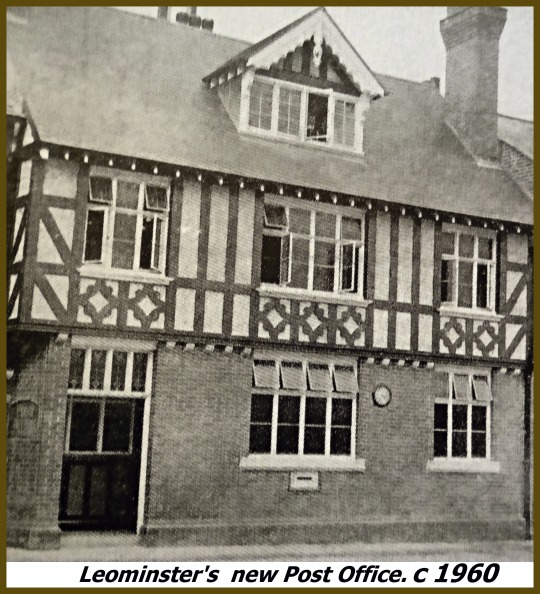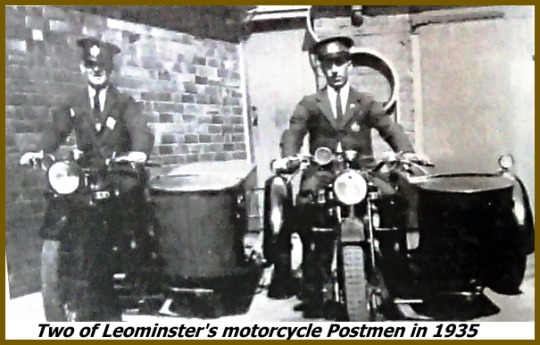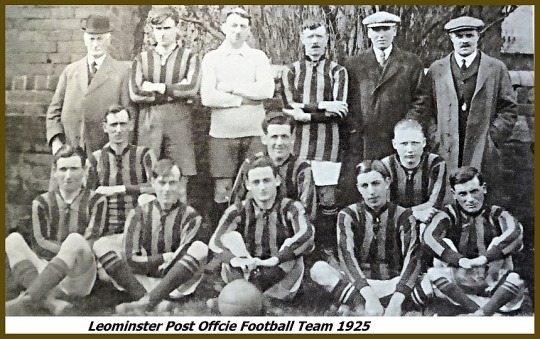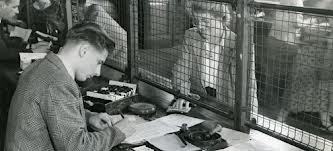#[[ THE HAT IS WORN BY DIFFERENT PEOPLE UNTIL IT FLIES AWAY OR THEY LOSE IT]]
Explore tagged Tumblr posts
Text
1930s Telegram Boy and the 1960s Post Service in Leominster.
This Post returns to the writings of Alec Haines. Most of this article reflects on the Leominster’s postal service in the 1930s. Focusing on the trials and tribulations of Bill Thomas a Telegram Boy.
The Post Office had been built in 1909.

It also provides an opportunity to reflect on Leominster’s postal service sixty years ago.
The 1960s Postal Service in Leominster no longer employed Telegram Boys. It was, however, a highly visible and important service for the local community. Like many other families we did not have a telephone. There were still two mail deliveries each day, early morning and late afternoon. Telegrams were delivered separately as they had to be signed for. Telegrams were still synonymous with bad news due the many delivering dreadful news during World War II.
Almost everyone was on first name terms with ‘their’ Postman. The term ‘Postmen’ was accurate, there were no ‘Postwomen’ that I can remember. Most working women were paid less than men even for doing the same job. Trade Unions and most working men feared women doing the job would lead to lower wages. Most Postmen had more than one job. They may well have been your window cleaner on another day. It is extraordinary that in 2018 a public organisation like the BBC is still paying women less for doing the same job as men.

They still wore the distinct uniform and cap worn for decades. Leominster had its own sorting office located at the rear of the main Post Office in the Corn Square. They appeared to be two totally detached departments. The Post Office was always busy with at least five counters open all day. Postal Orders were used by many people, especially those who did not have Bank Accounts. Having a Bank Account of course entitled you to a cheque book. Like many they did have a Post Office account. Dad always kept his Post Office Book in his jacket pocket. My parents certainly did not have a bank account or cheque book until the late 1960s. Many also queued to by stamps to save toward the telephone bill and T.V. License.
My experience as a casual Postman over the Christmas period was enlightening. The postbags were especially heavy this time of year. It was also a struggle to arrive at the sorting office by 6.00a.m.! However, by far the worst experiences involved dogs. How does a sign ‘Beware of the Dog’ actually help a Postman? You were under an obligation to deliver the Post no matter the obstacles, after all, it was the Royal Mail. The big bonus were the Christmas tips. It was not only given in the form of money; a warm mince pie was almost as rewarding as cash, especially on a cold morning. Not everyone cleared their paths of snow and ice. The people of Hampton Gardens saw it as a duty to not only clear their own paths but the street pavements as well. Ash collected from household fires was spread over the ice.

Alec Haines now writes much more lucidly about a 1930s Telegram Boy. Bill Thomas became a Telegram Boy in 1932 and was one of two boys employed by our local Post Office. Of very smart appearance with a round pill-box hat, highly polished leather pouch (to carry the telegrams) fixed onto a belt with shiny brass buckles, his uniform immaculate and his bicycle cleaned to perfection, he was inspected every day by the Post Master. All this presented to the public and accepted that this was the standard that made them to be worthy of being a part of the Post Office. The first telegram boy reported for work at 8 a.m., the other at 10 am. The last telegram had to be phoned for immediate delivery by 8 pm. Bill remarks on the times that he would have had the front wheel of the bike just inside the doors of the Post Office shed at two minutes before 8 pm. ready to go home, when the bell would ring and he would have to take a telegram to KIMBOLTON for a farmer who was a sheep dog breeder. On arrival “there the farmer would grumble to him. "There's a sheep-dog arrived at Leominster railway Station. Why didn't you bring it with you? Now I've got to cycle all the way down to Leominster and bring the dog back with me". Little did he realise that the telegram boy would not have known anything of its contents. The envelope was sealed by the man on duty inside the Post Office, who had received the phone call. During a normal working day the two boys would often deliver over a hundred telegrams. In those days seeing a boy going to a house with a telegram often brought fear or discomfort to anyone receiving a knock on the door, for it was usually sad news not good news. On the delivery of the telegram, the boy had to wait at the house for them to read its contents, in case a reply was needed. Telephones in those days were very rare indeed.

Many telegrams were to be delivered to extremely remote areas in the surrounding country-side. _ Sure enough they all seemed to come in for delivery a few minutes before 8 pm. when the telegram boy was expecting to finish work. Bill recalls how quite often he would have to deliver a telegram to THE CAMP at IVINGTON, or to the game keepers cottage in the long, dark, dense woood above BRIERLY COURT. Taking his bicycle along those roads in the middle of winter was in itself an endurance test. The only front lamp they had in those days was a small ” oil lamp” (paraffin) which barely threw a light even on to the front wheel. Hitting a pot hole in the road would throw the lamp off and those pieces now all over the road, had to be found, for he dare not proceed without a light. At the next gate a policeman would surely be there, unexpectedly waiting in case some poachers might come through the fields. To be caught riding a bike withoutlights was considered to be a very serious offence. His job was earning him 10 shillings and Sixpence per week which was too good to lose for the sake of a bicycle lamp, however poor its light.

The oil lamp had to be functioning properly, for young Bill, having just left school would have to leave his bicycle near a gate and carry the lamp with him if a telegram was to be delivered to MR. PARRY, the game keeper in BRIERLY WOOD. Proceeding through the field he approaches that thick, long wood. In total darkness he now moves into the wood, absolutely terrified, and starts to climb the very steep gradient. A briar from a bramble ‘bush sweeps his logs from under him as if he had been cut down by a scythe. The oil lamp, which he. had in his hand. rolled down into some bushes. There he crouches, striking match after match from the box to find it and relight the lamp before the paraffin has all spilled out. Birds fly about at his slightest movement. An owl flies uncomfortably near to his pillbox hat and settles in a tree very close to him. afraid of nothing in the wood. Black birds fly quite low. Pigeons take off from their high perches. preceeded by the cock pheasants which heard him get off his bike in the first place.
He fights his way slowly up through the wood and is encouraged by the bark of a house dog, for Bill had been stopped dead in his tracks by a fox that had jumped over a tree stump just in front of him. Breathing heavily, more from fright than fatigue, he sees a light from the game keeper’s house some way ahead of him. Climbing faster he notices in the shadow of the dimly lit doorway, a figure of a man with a shot gun resting beneath his arm pit. He had been just too late, for the fox had wanted something for supper but the gates of the pheasant pens were shut and bolted for the night.
The gamekeeper sees the small light approaching, picks out the light thatshines on those highly polished brass buckles and shouts a welcome to the holder of the lamp for he knows it must only be the Telegram Boy, it can be no other.
The lamp is replaced on the bicycle, he pedals back as fast as his legs will allow him. Just before rounding the bend at IVINGTON CHURCH he hears some scuffling just ahead, holds his breath but sees nothing. Only a quiet shrill squeak pierces the silence. The answer for this, was that further on perched on a parapet of the bridge over THE ARROW, a large owl was pecking away at something, and as the little light drew nearly level with the owl it flies away carrying something larger than a mole, could have even been a rabbit.
That was the last scare he had that night as he reaches the Post Office and pushes his bike into the shed which had once seen the front wheel at 7.59 pm. It was now 9.59 pm. He hastens home to clean his pill-box hat, his uniform, belt and boots for 8.00 am. He will still have to pass the inspection next morning by the Post Master who will never know that one of his lesser staff had fought a terrifying battle with nature the night before, and only just became successful.
A Postman in rural areas, was not just a man in uniform delivering and collecting letters and parcels, he was more of an AMBASSADOR for the Post Office, regarded by nearly every family as their personal friend who could be relied upon to bring from town many of the days necessities, papers, odd items of groceries, medicines etc. At Christmas time he was rewarded by them in so many different ways, never going without a drink from every household. The Country Postman usually managed to get home sometime during the twenty four hours of Christmas Day, whether he was delivering on foot or cycle.
There were, of course, instances when the postman failed to get home within reasonable hours, as happened to one whose round was mainly in and around the village of HAMNISH CLIFFORD. Well gone dusk he had not arrived home, his anxious family at their wits end contacted their near neighbours to organize a search party.‘ Word was sent to postmen at Leominster who then cycled to the voltage to join in the search. lle was eventually found at 4 am. fast asleep in a ditch still under the influence of drink. Scores of people had passed the spot looking for him. Fortunately, his mail bag fell beneath him and the water in the ditch. Like so many times before he would not be reported to the higher echelon of the Post Office; it was none of their business.
Today’s Postman in this part of England still aspires to all the qualities of his colleagues of years ago. Many are still on foot and bicycle in town, still bitten by dogs large and small, more frequently now for more houses means more dogs. He can at least get to hospital more quickly, for he is usually driving a van. This is a little more comfortable. Not many years ago a motor-bike and Sidecar was the speediest means of delivery and collection, each fitted with a carbide lamp. How easily one forgot to make sure there was enough water in the lamp until suddenly the light dimmed to the brightness of a lighted match as the bike sped along winding country roads doing 40 m.p.h., and finally the light going out all together. A complete stop had to be made until some water could found from out of a ditch or a brook to put into the special chamber of the lamp, this would then mix with the carbide powder giving off a gas which when lit gave a far better light than the oil-lamps (paraffin) which easily blew out in the wind. What a blessing when the inventor of the dynamo had his contraption fitted to the bicycle, the motor-bike and the motor-car. He saved the Post Office a lot of overtime payments and relieved the country-side of a decent amount of surplus water as well.
Today the speed of delivery of a certain special mail at a high rate ensuring thatany letter would reach its destination in any part of the UK. within 24 hours, has by extreme desire to fulfil those obligations delivered a letter via Shobdon Aerodrome to an address in Scotland by helicopter. To deliver that one letter could not cost less than £1,000.00 at today’s rates, yet an agreement had to behonoured and HER MAJESTY'S MAIL once more fulfilled their obligation.
0 notes